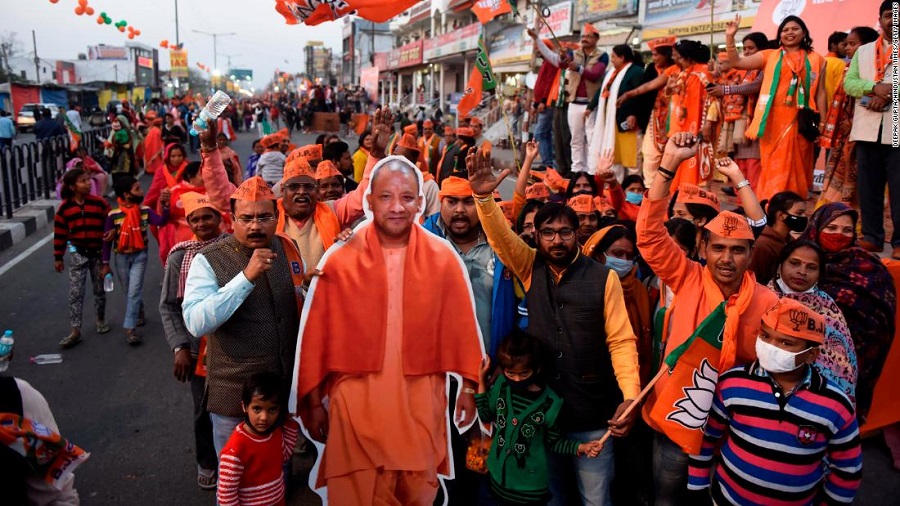
Ritesh Mishra vowed to care for the dead, even if it meant risking his own life last year as India's second Covid-19 wave tore through the country's most populous state.
The social worker said he didn't wear a mask or gloves as he gave funeral rites for more than 200 Covid victims on the banks of the sacred River Sarayu in northern Uttar Pradesh state -- it wouldn't have been what God wanted, he said.
"Those months were really devastating," he added.
But he doesn't blame the state's ruling Bharatiya Janata Party (BJP) for the Covid outbreak that many say was worsened by a slow government response -- and it didn't cost the party his vote in the state elections, which reports results on March 10.

The River Sarayu, where Mishra conducted more than 200 funerals for Indians who died from Covid-19.
Voters will decide if the state's controversial monk-turned-chief minister, Yogi Adityanath, remains the leader of Uttar Pradesh, a state with a population of more than 200 million. But more importantly, the election result will be a pulse check on support for the BJP and Prime Minister Narendra Modi, who faces his own test in the national elections in 2024 -- the first since the pandemic killed more than half a million Indians.
Despite the Covid crisis, experts say Adityanath has religion on his side -- he's pushing a Hindu-first agenda in a state with an 80% Hindu population. And that appeals to people like Mishra.
The social worker doesn't hold the government responsible for Covid deaths -- he blames lower-level officials who he says didn't follow government policy. He says he's voting for Adiyanath in this election for a very simple reason.
"They're constructing the Ram Temple in Ayodhya," he said, referring to a temple planned on land long contested between Hindus and Muslims, in a city believed to be the birthplace of Lord Ram, one of the most revered deities in Hinduism.
"That was their main goal."
Saffron flags -- a colour associated with Hinduism -- line the streets of Ayodhya ahead of the state election. Credit: Vijay Bedi
An unforgiving wave of infections
On April 17, 2021, as India's Covid cases were surging, a maskless Modi boasted to a sea of cheering supporters ahead of elections in the state of West Bengal: "I've never ever seen such huge crowds at a rally."
The same day, hundreds of miles away in the city of Lucknow in Uttar Pradesh, Harshit Srivastava, 32, was experiencing "the worst day of my life."
In truth, it started days before when his 65-year-old father Vinay started showing Covid symptoms. Fighting back tears, Harshit recalls how he drove to dozens of hospitals, begging for a spare bed, oxygen and medical care for his father.
As his oxygen levels dropped dangerously low, Vinay tweeted for help, tagging the Chief Minister Adityanath and other state officials. Citizens and journalists amplified his tweet, imploring officials to provide assistance. But none came.
Vinay died on April 17 in his family home, one of more than 23,000 deaths in the state during the pandemic -- though that number is considered to be a gross underestimation, according to witness testimony and images showing overwhelmed hospitals and overcrowded crematoriums.
"As a son, I had hoped we'd find a way to get help. But my father had no faith (in the government). He was sure nothing would happen," Harshit, a stock trader, said.

Vinay Srivastava photographed with his wife.
In the last election in 2017, the BJP won a landslide victory in Uttar Pradesh, securing the biggest majority for any party in the state since 1980. The BJP installed Adityanath as leader, a move experts say signaled its intention to push a stronger Hindu agenda.
Five years later, the BJP faces a strong challenge from the opposing Samajwadi Party led by the 48-year-old former chief minister, Akhilesh Yadav.
Yadav's promise of free electricity to all households and interest free loans to farmers has gained some support -- especially among farmers angered by Modi's controversial farm laws. And some experts say that, coupled with the devastation from the pandemic, could be enough for Yadav to win over some loyal BJP voters.
"This election is very close," said Rahul Verma from India's Centre for Policy Research. "The BJP, owing to its massive 2017 victory, has some advantages. But the Samajwadi Party has managed to mount up a very effective campaign against the BJP (with its) mismanagement during Covid."
Once a staunch supporter of the BJP, Srivastava says he's no longer interested in casting a vote.
"I will not vote for anyone in this election," he told CNN last month. "They tell lies. They make temples for promotion, and give the poor money sometimes. They took everything I had from me."
A bastion of the Hindu-right
The appointment of Adityanath, a Hindu priest, indicated to some experts that the BJP's Hindutva ideology -- which strives to make secular India the land of the Hindus -- far outweighed the party's commitment to economic development in the state.
Zoya Hasan, a political scientist and fellow at the Indian Council of Social Science Research, said Adityanath's appointment "was a very deliberate choice to signal the BJP's Hindutva agenda."
Since Adityanath took office, the state has already passed legislation that, critics say, is rooted in Hindutva ideology. It has protected cows, an animal considered sacred to Hindus, from slaughter, and made it increasingly difficult to transport cattle. It also introduced a controversial anti-conversion bill, which makes it harder for interfaith couples to marry or for people to convert to Islam or Christianity. Some cities named after historic Muslim figures have also been renamed to reflect India's Hindu history.
"Uttar Pradesh is very important for the BJP, not just because of its sheer size, but because it is a principal Hindutva laboratory," said Hasan. "Let's not forget that the three most important Hindu shrines are located here. Yogi (Adityanath) is trying his best to promote Hindu and Muslim polarization."

A street vendor seels saffron flags ahead of Uttar Pradesh's state election.
Adityanath is known for his provocative rhetoric against Muslims.
He once praised former US President Donald Trump's travel ban barring citizens of several Muslim-majority countries and called for India to take similar measures, according to local channel NDTV. And in February, he used a derogatory word when referring to Muslim men in an interview with a local television channel.
Adityanath's cabinet members have denied allegations they are promoting Hindu nationalism, and that they mishandled the pandemic, saying they have brought millions out of poverty through economic reform.
While the state's unemployment rate is unclear due to millions working in the informal sector, government statistics show it has grown since 2017.
"BJP's poll agenda was, is and will always be development," Dinesh Sharma, the state's Deputy Chief Minister, told CNN. "We will ensure law and order across the state. We will ensure the poor have water, food and electricity. And we promise the welfare of farmers."
A promise for Hindu temples
In August 2020, eight months before Uttar Pradesh was devastated by India's second Covid wave, Modi laid a foundation stone for the construction of a Hindu temple in the holy city of Ayodhya.
For decades, Hindu groups have campaigned for a temple to Lord Ram be built at the site, where a 16th century mosque -- the Babri Masjid -- once stood.
After Hindu extremists destroyed the Babri Masjid in 1992, more than 2,000 people -- mostly Muslims -- were killed in nationwide rioting, some of the worst violence seen in India since independence.
Thirty years later, the people of Ayodhya are pushing for more temples to be built, and local priest Seer Pawan Kumar Sad Shastri says he knows which way the city's population of nearly 2.5 million will vote.
"The people in Ayodhya will only vote for (devout Hindus)," he said.

Seer Pawan Kumar Sad Shastri says he will vote for the BJP because they are in favor of Lord Ram.
Whether it's enough to give the BJP and Adityanath another term in office remains to be seen.
According to Verma, from India's Centre for Policy Research, the BJP is counting on a "mixed strategy" of economic reform -- attracting investment, supporting small businesses and creating new jobs -- and religious polarization.
"They are pivoting more to their ideological beliefs," Verma said, adding this rhetoric energizes Adityanath's "core base" of right-wing Hindu voters.
In recent years, there have been numerous reports of extrajudicial killings and violent reprisals from state law enforcement. But Shastri says Adityanath has done a good job in maintaining law and order.
In December 2019 the state imposed a colonial-era law banning public gatherings following clashes during a protest against India's Citizenship Amendment Act that would give immigrants from three neighboring countries a pathway to citizenship -- except for Muslims.
"Our next mission is constructing grand temples for our Gods in other holy cities," Shastri said.
But Srivastava, who lost his father in the second wave, says no amount of temples could ever bring back his father -- he wants the government to acknowledge its failure to reduce Covid deaths.
"I want to ask Yogi to put his hand on his heart and ask himself if he has done the right thing," he said.
"Lord Ram doesn't need a temple as much as the country needs a proper government."











